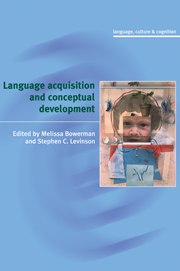Book contents
- Frontmatter
- Contents
- Preface
- Introduction
- Part 1 Foundational issues
- 1 The mosaic evolution of cognitive and linguistic ontogeny
- 2 Theories, language, and culture:Whorf without wincing
- 3 Initial knowledge and conceptual change: space and number
- Part 2 Constraints on word learning?
- Part 3 Entities, individuation, and quantification
- Part 4 Relational concepts in form–function mapping
- Author index
- Subject index
2 - Theories, language, and culture:Whorf without wincing
Published online by Cambridge University Press: 26 January 2010
- Frontmatter
- Contents
- Preface
- Introduction
- Part 1 Foundational issues
- 1 The mosaic evolution of cognitive and linguistic ontogeny
- 2 Theories, language, and culture:Whorf without wincing
- 3 Initial knowledge and conceptual change: space and number
- Part 2 Constraints on word learning?
- Part 3 Entities, individuation, and quantification
- Part 4 Relational concepts in form–function mapping
- Author index
- Subject index
Summary
If there is one clear conclusion to be drawn from this volume it is that, after decades of obloquy, Benjamin Whorf is back. Of course, Whorf never really went away in the popular imagination or in the wilder reaches of the post-modern humanities. In serious cognitive psychology and cognitive science, though, that very fact reinforced the sense that Whorfian ideas were disreputable, not to say crackpot. In contrast to this scornful tradition, many of the chapters in this volume, both empirically and conceptually, seriously explore the possibility that the language we hear can have strong effects on the ways that we understand the world.
Aside from the sociology there were more serious reasons why cognitive science rejected Whorf. There were obvious empirical objections to his work. More broadly, Whorf presupposed a relativist, indeed a wildly relativist, and anti-realist ontology. In contrast, cognitive science is realist and anti-relativist almost by definition. “Cognition” refers to the way that we learn about the world around us in an at least roughly veridical way, and the assumption of cognitive science is that there are general procedures all human beings use to do so. Since the late 1960s psycholinguistics has built on this cognitive foundation.
In this chapter, I will outline an approach to the idea that language restructures cognition that is congruent with the wider insights of cognitive science rather than in conflict with them.
- Type
- Chapter
- Information
- Language Acquisition and Conceptual Development , pp. 45 - 69Publisher: Cambridge University PressPrint publication year: 2001
- 14
- Cited by

